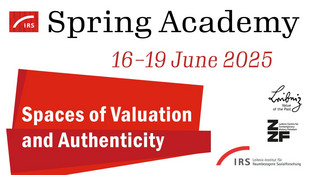Main Content
Patrik Aspers: Spatial Arenas of Value Making
Keynote Lecture at the 2025 IRS Spring Academy

On the first day of this year's IRS Spring Academy, Patrik Aspers will give a keynote on "Spatial Arenas of Value Making".
This talk addresses the question of value making: How does value come into being? The main thesis is that spatial arenas are important for value making. The idea put forward here goes beyond the simple observation that human co-presence in physical space matters. The focus is on certain arenas, which are integrated elements in value-making and value-sustaining processes. Value is a general issue, not restricted to the economy. The talk will present ideas about relational thinking and explore how this approach can enhance our understanding of value. The notion of status will also be discussed – offering a concrete tool for the analysis of value arenas. The first empirical case focuses on value-making in the field of performance art. Performance centers on the bodily presence of the artist and their interaction with spatial possibilities. Value is established by onlookers and by peers who are co-present and assess how the artist engages with the physical space. The second case focuses around the value creation of craft products presented at fairs. Fairs are physical arenas where craftspersons and consumers come together and devote time to one another, thereby imbuing the crafted object with value and making it ‛unique’.
The keynote will be held live at IRS and streamed online via Zoom for the public.
Prof phD Patrik Aspers is Chair of Sociology at the University of St. Gallen, having previously held a chair at Uppsala University and worked at the Max Planck Institute for the Study of Societies in Cologne. He holds a PhD (2001) from Stockholm University. His research interests include economic sociology, qualitative research, sociological theory, uncertainty reduction, and organizational sociology.


